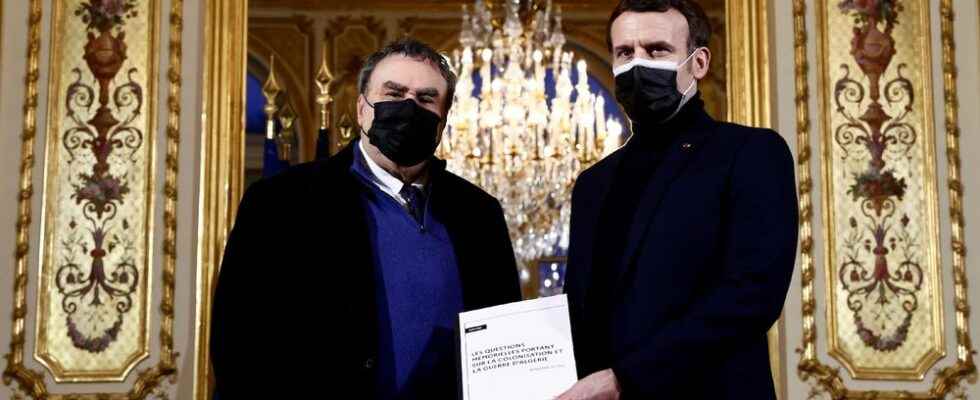A journey to mend the broken pots. Emmanuel Macron is expected in Algeria this Thursday, August 25 for a three-day official visit, with discussions on gas, the memorial relationship and visas. The opportunity also for the French head of state to turn the page on tensions with Algiers, following his statements last year on the “memorial rent” maintained by the Algerian “politico-military” regime.
On either side, a warming of relations would be of definite interest, according to Kader Abderrahim, lecturer at Sciences Po and author of Geopolitics of Algeriapublished by Bibliomonde.
L’Express: Emmanuel Macron decides to go to Algeria at the start of his second term. Is this a strong symbolic gesture to relaunch the relationship with Algiers?
Kader Abderrahim: It is an important symbolic gesture, especially at a time when, in parallel, the relationship between France and Morocco seems much more difficult. However, this is not without political ulterior motives on either side. For Emmanuel Macron, it is above all a question of trying to relaunch his project of reconciliation between the two countries, after several months of crisis. Moreover, the trip to Algiers is a necessary exercise for any French president, given the history and the presence of a large Algerian diaspora in France.
But for President Tebboune, this visit is also of interest. Indeed, it can bring a form of recognition to the regime, which is at an impasse on the internal political level after the Hirak and three years of demonstrations by the population against the Algerian leaders.
On the diplomatic level too, is this visit of interest to Algiers?
Absolutely, insofar as Algiers faces a certain number of difficulties on the diplomatic level between the rupture of its relations with Morocco and its anger with Spain. The situation in its regional neighborhood is also worrying, with Libya in the west still plunged into chaos and Tunisia still unstable. In the South, the terrorist risk from the Sahelian zone could also threaten its oil and gas fields, which constitute its main source of wealth. Algeria is therefore seeking to forge ties with powerful partners, including France. A fortiori in this phase of uncertainty and reconstruction of the international order linked to the war in Ukraine.
President Emmanuel Macron poses next to historian Benjamin Stora after the publication of his report on the memory of colonization and the war in Algeria, January 20, 2021 in Paris
afp.com/CHRISTIAN HARTMANN
Is the same for France?
Indeed. We see today that countries like Turkey, Russia or China are seeking to strengthen their influence in the Maghreb. France is pushed into its comfort zone. However, it cannot afford to lose its influence in the Maghreb, at the risk of seeing its power weaken. It must therefore imagine and build, in the new international order that is emerging, a new relationship with these countries, taking into account the interests of each. In this context, this trip is very important if France wants to maintain its influence on the African continent. The relationship between France and Algeria is unique, because the two countries are partners by necessity, not necessarily by choice. But they need each other today, because they face threats and challenges that they cannot face without each other.
In a context where Europeans are looking for alternatives to Russian gas, can Algeria have a card to play?
Algeria may possibly increase its gas production, but it will not have the capacity to replace all Russian supplies on a European scale. It is certainly one of the world’s top ten producers, but its capacity remains quite limited compared to the United States, Russia or Qatar. That said, it remains likely that this will be one of the international topics covered during this visit by President Macron, insofar as energy has become a real geopolitical weapon.
Will the question of visas granted by France to Algeria, the number of which has been considerably reduced since 2021, also be addressed?
I actually think that this subject will be put on the table, like the question of Algerian delinquents that Algeria sometimes refuses to take back when they are expelled from France. This remains to be determined, but it is possible that this visit will lead to an increase in the number of visas granted to Algerians and, in return, an increase in the number of Algerian consular passes, allowing the return to Algeria of Algerian nationals whom France wishes to expel.
Memorial issues will also certainly be addressed and I would not be surprised if an announcement were made on this subject. Finally, discussions should take place on the security situation after the withdrawal of Operation Barkhane and the French military from Mali.
In an open letter published on Sunday, a dozen Algerian diaspora organizations asked Emmanuel Macron “not to hide” the subject of the “degradation” of human rights in Algeria. Do you think this issue will also be on the French president’s agenda?
It’s hard to say, but diplomats are used to saying that to be effective on the issue of human rights, things have to be discreet. To do so publicly would risk reigniting tensions with President Tebboune and prove counterproductive. If the subject is raised, it is therefore likely that President Macron will prefer to do so during his one-on-one meeting with his Algerian counterpart. Afterwards, will this make it possible to change the situation on the question of democracy, individual and collective freedoms, and human rights in Algeria? It is very unlikely. On the other hand, it is possible that the Algerian regime agrees to make a gesture by releasing, for example, a few prisoners of conscience, who do not really represent a threat to it.
